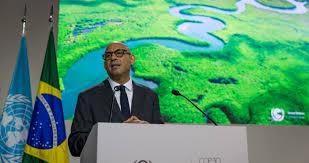COP30: UN canvases emissions reduction, resilience strengthening

SIMON Stiell, the Executive Secretary of UN Climate Change, has called on countries to deepen efforts toward reducing emissions and strengthening resilience to tackle climate change.
Stiell made the call on Monday in Belém, Brazil in his remarks at the opening of the 30th United Nations Climate Change Conference (COP30).
According to him, taking faster steps on reductions of emissions and strengthening resilience is crucial to bring back temperature to 1.5°C.
He said the future that was designed 10 years back in Paris had started seeing the curve of emissions bending downward with governments legislating, and markets responding.
He , however, stated that much more work still needed to be done.
”The science is clear: we can, and must bring temperatures back down to 1.5°C after any temporary overshoot. Lamenting is not a strategy. We need solutions.
”We find ourselves here in Belém, at the mouth of the Amazon. And we can learn a lot from this mighty river. The Amazon isn’t a single entity, rather a vast river system supported and powered by over a thousand tributaries.
”To accelerate implementation, the COP process must be supported in the same way – powered by the many streams of international cooperation, because individual national commitments alone are not cutting emissions fast enough,” he said.
He said there was no need to wait for late Nationally Determined Contributions (NDCs) to slowly trickle in, to spot the gap and design the innovations necessary to tackle it.
”Not one single nation among you can afford this, as climate disasters rip double-digits off GDP.
‘To falter whilst mega-droughts wreck national harvests, sending food prices soaring, makes zero sense, economically or politically.
”To squabble while famines take hold, forcing millions to flee their homelands, this will never be forgotten, as conflicts spread.While climate disasters decimate the lives of millions, when we already have the solutions, this will never, ever be forgiven.
”The economics of this transition are as indisputable as the costs of inaction. Solar and wind are now the lowest-cost power in 90 per cent of the world. Renewables overtook coal this year as the world’s top energy source,” he said.
According to Stiell, investment in clean energy and infrastructure will hit another record high before the end of 2025 with investments in renewables outstripping fossil fuels 2 to 1.
He said the conference would focus on deals to strike and accelerate tripling of renewables and doubling energy efficiency as agreed to transit away from fossil fuels.
”Now is the time to focus on how we do it fairly and orderly. We have already agreed to deliver at least $300 billion in climate finance, with developed countries taking the lead.
”We now need to put the Baku to Belem Roadmap to work. To start moving towards the $1.3 trillion. We have already agreed to a global goal on adaptation.
”We now need to agree on the indicators that will help speed up implementation, to unleash its potential,” he said.
Stiell called on countries to agree on concrete steps to turn aspirations into actions on transition pathways to cover whole economies and societies.
He urged all countries to properly key into the agreed technology implementation programme to keep it in motion.
Stiell said every gigawatt of clean power would cut pollution and create more jobs.
He added that every action to build resilience would help to save lives, strengthen communities, and protect the global supply chains that every economy depends on. (NAN)




